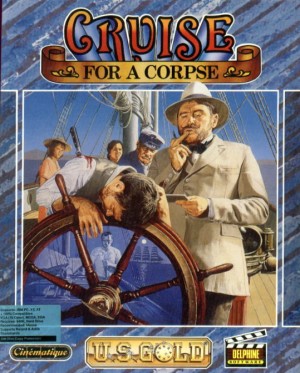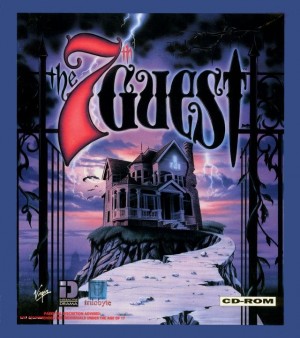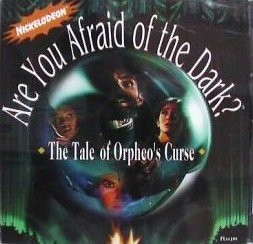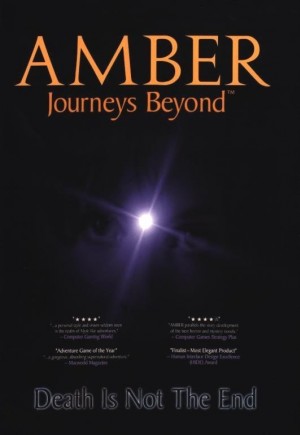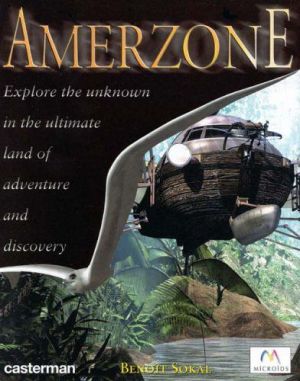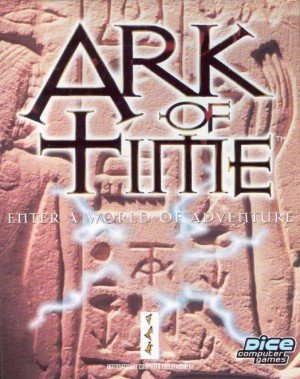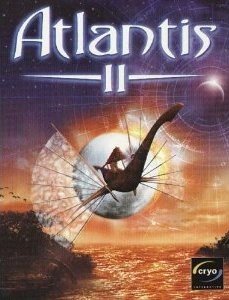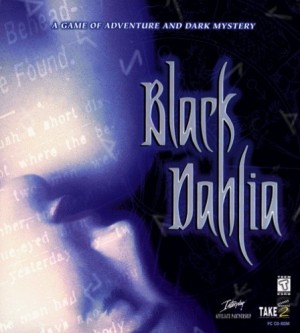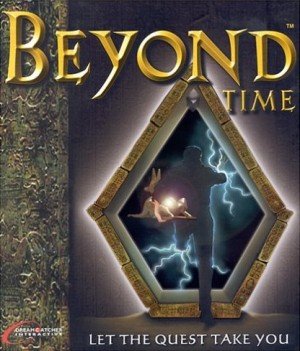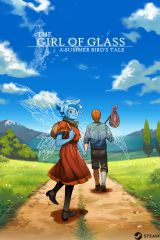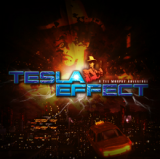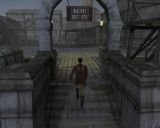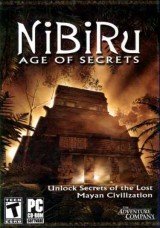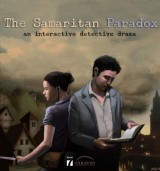Review for Cruise for a Corpse
It is sort of amusing, in light of the amazing spectacles modern gaming has given us, to think that deep inside the brain of a computer is a series of on/off switches, and millions of these little switches repeatedly flipping become our favorite games. This is binary code, the brain behind every computer program in history. At a less geeky level, on/off switches known as variables are used to direct the flow of adventure games. Flags are set to drop when a certain event happens, and based on the position of said flag, characters react differently to certain things.
The best adventure games cover the inhumanity of such a system with amazing skill, and create the illusion of a dynamic world populated with equally dynamic characters. The weaker adventure games fail miserably to create this world, and instead expose the inner workings of their game as an unnatural series of flipping switches. Cruise for a Corpse is, unfortunately, such a game.
The third, and final, third-person pure adventure game developed by Delphine Software (more famous for the console cult classics Out of This World/Another World and Flashback), 1991's Cruise for a Corpse takes a great subgenre (the murder mystery adventure), drops it into an excellent setting (a luxury cruise) with a multi-layered story--and populates it with a parade of uninteresting and completely static characters, including a ludicrously boring hero, and tops it off with a near-complete ignorance of common adventure game mechanics.
CfaC derives its framework from the mystery novels of the great Agatha Christie--in fact it goes out of its way to let you know this, as the game's one stab at humor is the presence of "Tagatha Frisbee" novels on the office bookshelf. You play a French inspector who is invited on board a luxury cruiseliner owned by a wealthy businessman, when suddenly your host is murdered. You’ll soon learn that the other guests on board have a series of complicated and bizarre connections to each other, familial and otherwise, and in the grand Christie tradition you will proceed around the ship to solve the mystery and generally get more involved in everyone else’s personal affairs than you probably wanted.
Christie's novels differed decisively, however, in one key area--they were clearly and concisely written, mixing key details and evolving revelations and relationships with a need to keep readers interested and in tune with the story twists. While perhaps there is something to be said for dialogue being lost in translation (Delphine Software was a French company), there is no getting around the fact that dialogue in this game is clumsy, and often bordering on unreadable--usually reaching its ugliest points at key moments of revelation, which completely sucks the air out of what should be an important moment.
The setting of Cruise is a very claustrophobic one--there are only 15 "corridor backgrounds" in the entire game, plus 10 or so interior rooms, many of which are only accessible at certain times. The game takes place over one day, beginning at 8:00a through the conclusion at 6:30p. This sounds very much like the brilliant Last Express, with one key exception: time does not proceed unhindered in Cruise, but jumps in ten-minute increments as you complete certain tasks. The result, ideally, should be a natural flow that finds characters logically moving from one area to another with some sort of reason. Instead, with each ten-minute jump, characters are seemingly randomly redistributed across the boat, half of them disappearing into a void and most of the others locked up in their cabins. The time dynamic is really used poorly, too; you would expect some eavesdropping or anonymous notes to lead you to a certain room at a certain time, but the time of day is never made reference to in the game (other then when you advance it and the clock pops up).
Getting the clock to advance is also a disastrous chore at times. You can ask a certain person about a certain topic at 1:30p and it's really to no one's benefit. But ask that same person, about that same topic--and get the exact same answer--at 2:50p, and whammo, you have advanced the clock! That's one of the game's biggest failings; the "triggers" are only triggers at certain points in time, causing a painfully forced linearity rather than allowing the player some sort of diversity in finding clues and questioning suspects. The fact that there's usually only one or two suspects available to question at any given time is also frustrating.
This trigger ugliness is present with the search for physical clues, as well. There is a bin in the laundry room, for example, that you can search at any time. It's empty for most of the first half of the game, but it magically and for no reason has an important item in it mid-afternoon that you must find to advance the clock. I'm not opposed to this in itself, but what's frustrating is that there is absolutely no indication that you should ever search there again after the first time. There's no graphical indication of the bin being disturbed. There are no important characters ever in the room, leading you to the thought that they may have left something there. It almost seems purely random. The switch just flips, and once you realize that this is how the game operates, you realize that you really do have to try every action on every item and ask every character every question in every ten-minute increment until you find the right trigger. The use of logic and natural progression has apparently abandoned ship.
Don't be led to believe that you'll actually acquire much of a collection of clues in this game either; the ship is full of tantalizing inventory that you can't take. In fact, our "hero" has a lot of clever comebacks such as "It's not mine" and "Why would I want that?" Oh, excuse me, Inspector. I was under the impression that you may want to examine things that don't belong to you when you're TRYING TO SOLVE A MURDER. This is an adventure game, for crying out loud; the last thing I want to do is be told all day that I can't take things, can't search things, can't open things. It's completely against the laws of adventure gaming as a whole, and is compounded exponentially by the fact that you're trying to solve a mystery here. Imagine Nancy Drew (or better yet, one of Agatha Christie's heroes) saying "Yeah, so there's a drawer in the room of the drunken gambler with a motive who was the last person seen with the victim. But I don't think I'll open it. That doesn't make any sense. I'd better just go make my rounds in the laundry bins again." I guess I should mention the pixel hunting, as well (a problem in Delphine's other adventures Future Wars and Operation Stealth); when there are objects you'll need to take, oftentimes you won't even see them unless you know that they're there. There's a note on a cabin floor at one point in the game that you're supposed to find--but it's hidden under your feet when you walk into the cabin. What are the odds, eh?
I do have good things to say about the graphics and interface. The context-sensitive interface at least saves the time of having to try every verb with every noun--as right-clicking on an object only gives you access to the verbs that apply to that object. This is one very positive development of Delphine's Cinematique engine. The characters are animated polygons, a technique made famous on consoles by the aforementioned Out of This World and on PC's by Infogrames' Alone in the Dark. This allows for very fluid animation and at the time of release, some of the cutscenes certainly must have looked splendid. The same most definitely can not be said about the music, which is uninteresting, obnoxiously tinny in its sound, and painfully repetitive, serving as a test of willpower as to how long it will take you to mute it.
I customarily make a reference to the amount of time it takes to play through an adventure that I review, but it’s really a total crapshoot with Cruise. You may find yourself very lucky, stumbling onto the triggers a lot quicker than I did. You may advance two game hours in the span of half an hour through a series of lucky clicks. Or you may have my luck and detective prowess, and have to desperately comb the frigging ship every ten minutes. Since the game predates the era of voice acting, if you’re a reader of reasonable speed I would imagine the average adventure fan will finish in 9-13 hours. Given a walkthrough, the game can be finished in under an hour, though you’ll miss a good amount of backstory.
Most tragically, and as is the case in so many mystery adventures with such massive failings in most of the technical and gameplay aspects, the story is really quite a nice one, and certainly must have looked great on paper. Were I to read this story as a novel (in more capable hands, of course) I have no doubt I would enjoy it; the twist at the end is a worthy payoff. But as Post Mortem and Jack the Ripper and so many older mystery adventures have taught us, even the best story can be killed by poor storytelling, and despite the payoff, will you really care when it's all said and done? Will you even want to finish? If you do finish it, will you really understand what just happened? There are some who fearlessly defend Cruise for a Corpse as one of the standout unknowns of the Golden Age, but despite a couple noteworthy technical accomplishments and a well-conceived story, it is not pleasant to play through and not worthy of any comparison to the great Agatha Christie--or even Tagatha Frisbee.




